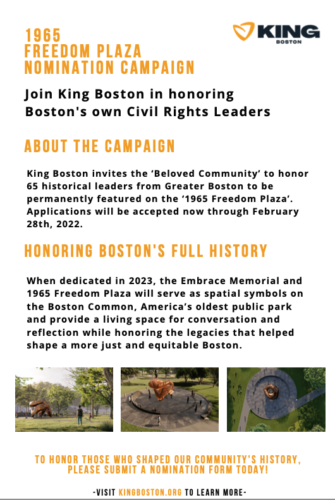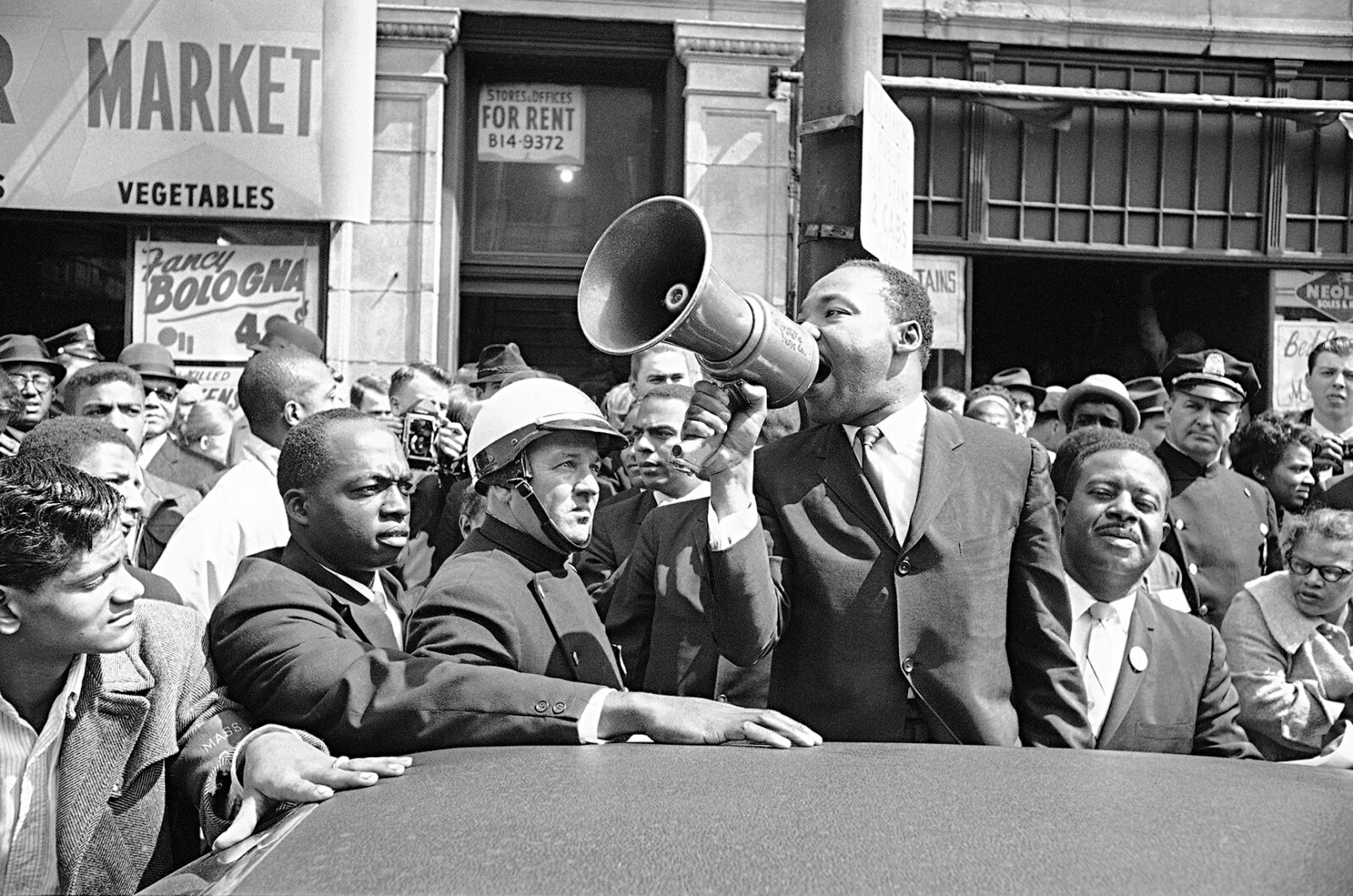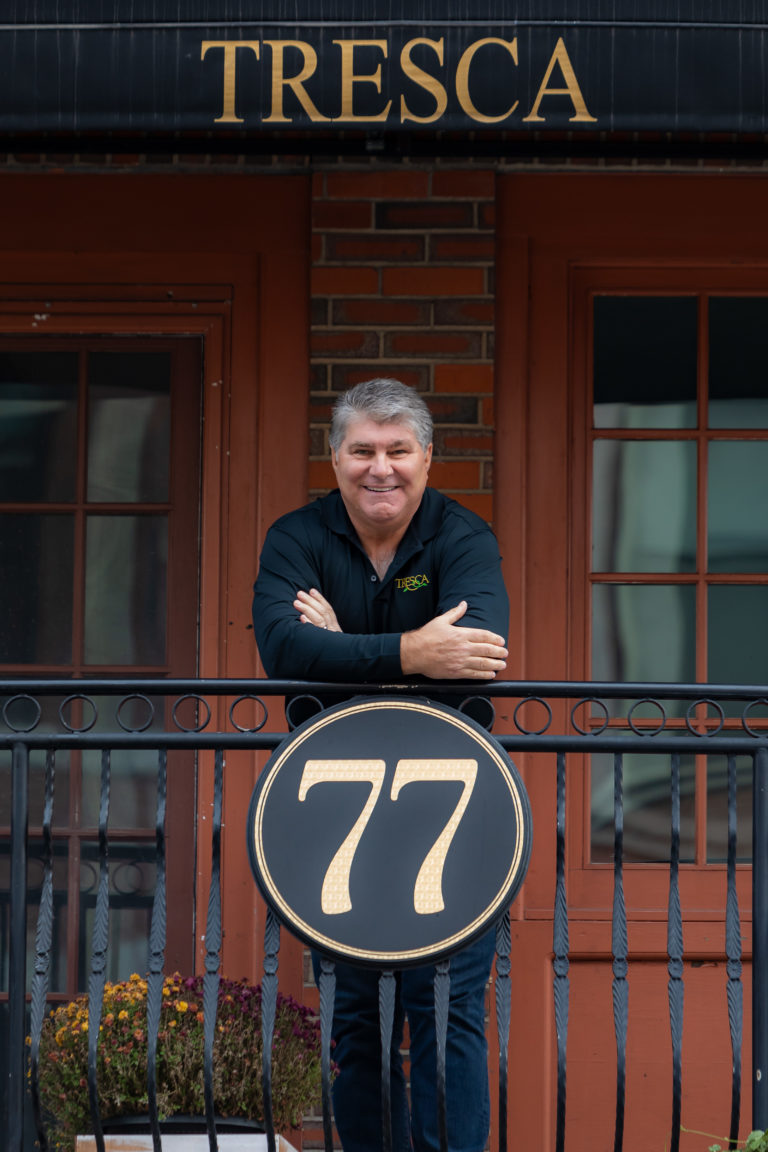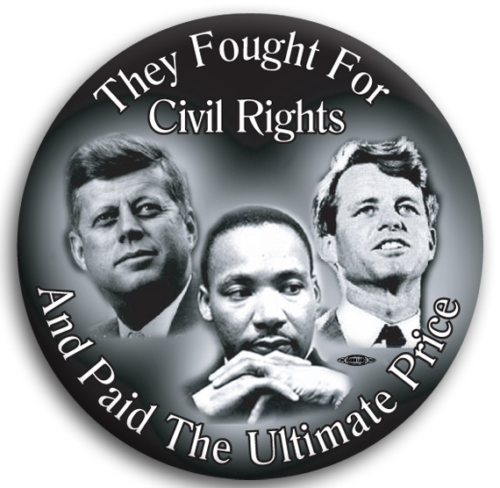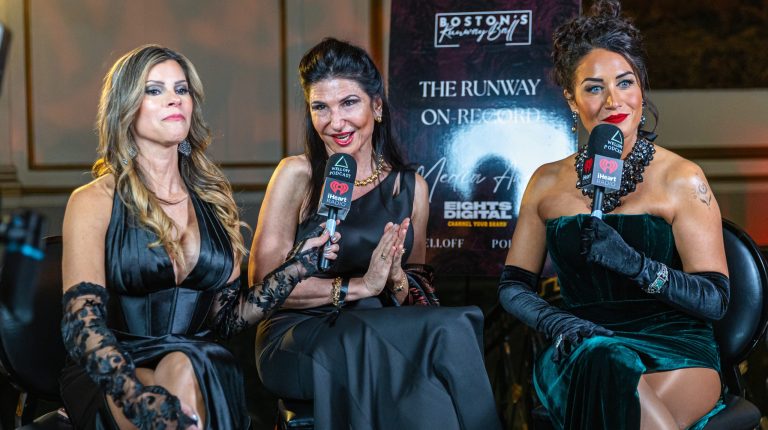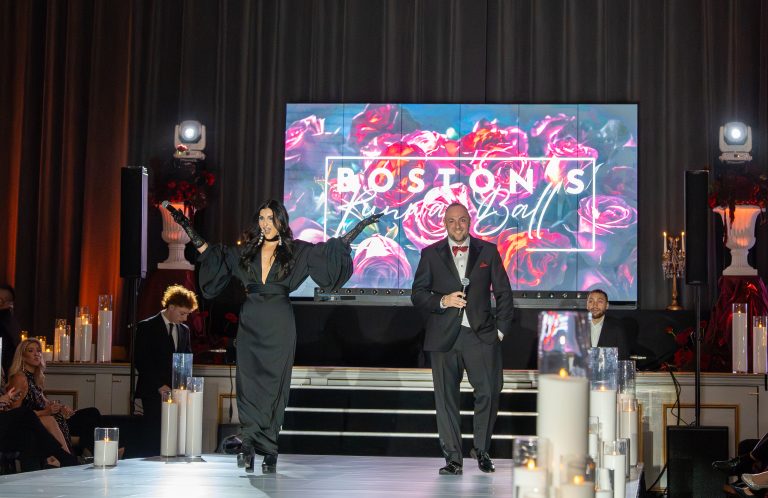ML King and Coretta Scott first met right here in Boston. Their love story is one of true beauty. With the coming of The Embrace Memorial MLK Weekend 2023 (among other projects) KING Boston continues to enlighten, educate, and preserve the wonderful contributions to history and culture by people of color throughout Boston.

It is September 1951, and twenty-two year old ML King is making the long drive from his home in Atlanta to Boston where he is about to embark on his doctoral studies at Boston University.
Following a back and forth summer debating with his father Daddy King, the Reverend Martin Luther King Sr, on whether he should immediately begin minister work (something ML was not positive he wanted to do) or continue his scholarship, the elder King finally relented and blessed his son with a brand new green Chevrolet, equipped with power glides, and packed with some of the finest tailored suits the northeast was about to see, for his pursuits in Boston.
“Don’t get distracted up there,” Daddy King is said to have warned his son. “You need to be back home soon to marry into one of the socially prominent families we have lined up for you.”
“His years here were an important time for him,” says Imari Paris Jeffries, Executive Director at KING Boston. “And it is Boston, of course, where he met Coretta Scott.”
Dr. Martin Luther King Jr and Coretta Scott King, their lives and legacies, are a beautiful love story. It was here in Boston, in the spring of 1952, where they first met, starting their story together.
KING Boston
KING Boston is a non-profit dedicated to creating programs and a new memorial, The Embrace, honoring the work and time Dr. King and Mrs. (Coretta) King spent together in Boston. The mission, says Jeffries, is to keep the dream and vision alive the couple shared in pursuing equality through love and non-violence.
“As much that has been written on Dr. and Mrs. King,” Jeffries points out. “There is still so much more to their legacies, and time in Boston that can further be honored.”
This past year on MLK Day, King Boston, in conjunction with Amazon, The Boston Foundation and NBC10 released a documentary titled Voices on King that dives into such explorations.
The 30-minute special, produced by Beyond Measure Productions, navigates some of the under-told -and in some cases, never before told- stories on the Kings time in Boston, the city’s influence on the Harlem Renaissance, and other narratives that have helped shape Boston’s diversity and global impact.
It’s one of several initiatives, explains Jeffries, that will culminate with the completion and unveiling of The Embrace Memorial and 1965 Freedom Plaza on MLK Weekend 2023 (Friday 1/13) in Boston Public Garden.
“It’s a very appropriate memorial to honor (Dr. and Mrs. King),” Jeffries says of The Embrace. “The design is from a beautiful picture of them hugging -embracing- where you feel the love, respect and bond they had for each other.”

Coming to Boston
The influence Boston had on the lives of both Martin Luther King Jr and Correta Scott King is significant.
When King arrived in the fall of 1951, he had yet to acknowledge his first name as “Martin Luther.” Born Michael King, Jr on January 15th, 1929, King was just a young boy when his father legally changed both of their names to Martin Luther.
Equal part confused and annoyed by the name change, King insisted that family and friends call him “ML.” It wasn’t until 1955, while leading the Montgomery Bus Boycott, when a reporter asked King to state his name that he first publicly referred to himself as “Martin Luther King, Jr.”
Still developing his intricate thought processes surrounding theology, the underlying factor in choosing Boston University for his doctorate studies was a BU professor, Edgar S. Brightman.
Brightman was paramount in advancing a movement called Boston Personalism. The teachings, which center around an intellectual stance on the importance of human persons, was in-line with where young ML’s beliefs were.
In Brightman, King would have a mentor and teacher to further refine and develop his understanding and love for humanity.
That autumn while attending his first lecture with Brightman, King somewhat prophetically scribbled across his notebook: “The only proof of immortality is a life worth preserving.”
King connected immediately with both Brightman and his teachings. Ten of the first fifteen courses he took at BU were with either Brightman or his protégé, L. Harold DeWolf, with whom King quickly emerged as a favorite student.
Soaking up the ideologies of Personalism, King would write at least two of his most famous sermons, “Three Dimensions of a Complete Life” and “What is a Man,” while studying in Boston, both of which would go on to be staples in his lectures and speeches for the remainder of his life.
He first preached these and other sermons as an assistant minister at the prestigious Twelfth Baptist Church in Roxbury, a successor to the historic African Meeting House on Beacon Hill.
The Dialectal Society
A natural leader and gifted orator, it wasn’t before long that ML King formed his own intellectual club in Boston. Once a week, King and others would gather at ML’s South End apartment on Mass Ave (shown in the Voices on King documentary) for a pot-luck dinner to discern, debate, and dissect philosophical essays prepared for and presented by members of the group.
The club, dubbed “The Dialectal Society” by King, quickly grew in popularity around campus with both black and white students participating, and even Professor DeWolf periodically coming by to present a thesis.
ML mostly dictated the topics of the essays, which ranged primarily in theology and philosophy. He would occasionally lose members of the club who grew frustrated with King’s hesitancy at the time to dive full on into activism and other political subjects.
King reasoned that it was wiser for the group to continue to develop and refine their ideologies before moving too quickly into other areas.
“The world will not be converted over-night,” he has been remembered as saying at these meetings. But deep down, he knew he would one day be addressing segregation and racial inequalities.
“I got back from a funeral,” ML once announced to the club in a session where the group could have been theorizing their own futures. “Poor Jim,” he continued. “I had to bury Jim Crow today.”
The Boston Bachelor
ML King enjoyed many of the things most post-war young men living in Boston in the early 50’s did.
He was self-described as somewhat of a pool shark. He enjoyed the various jazz lounges and cultural music Boston’s South End had to offer (as shown in Voices on King). From time to time you could find him over at the William E. Carter Playground playing pick-up basketball with his friends.
He also joined the Sigma Chapter of Alpha Phi Alpha fraternity in Roxbury, whose members included future U.S. Senator Edward Brooke.
And on most Friday or Saturday evenings ML would be out double-dating with a fraternity brother or galivanting around town -perhaps at Wally’s (which remains today at 427 Massachusetts Avenue), Slades’, the Savoy, or the vibrant art deco Hi-Hat jazz club– searching for the future Mrs. King.
ML and his friends had long developed secret codes in identifying women they were interested in. A “doctor” was a decent looking woman who could have some promise. While a “constitution” was a well-established and endowed lady who would make men stop in their tracks.
With the invention of direct-dial long distance calling in November 1951, Daddy King and Mrs. (Alberta) King now literally had a direct line from Atlanta into ML’s life. They frequently checked in for updates on the prospects of his finding a spouse.
In early 1952, on the advice of a friend, ML blindly called a “constitution” he was told he absolutely had to meet. Wanting to make a good first impression over the phone, ML chose to lead with one of his sure-fire opening lines when talking to women:
“You know, every Napoleon has his Waterloo,” ML told the young lady. “And I’m like Napoleon.. I’m at my Waterloo, and I’m on my knees.”
“That’s absurd,” the young lady replied back to him. “You don’t even know me.”
Yet over the course of that first phone conversion she knew she was talking to a man of substance. An educated man who cared for and loved humanity. Mixed in with his cringe-worthy “lines” was a thoughtful man the young lady knew had a meaningful life ahead of him.
Coretta Scott
Coretta Scott agreed to go to lunch with ML the next afternoon following their first phone conversation. Two years his elder, she was in Boston for a fellowship at the New England Conservatory of Music.
Picking her up in his fancy green Chevrolet, ML took Coretta to Sharaf’s Cafeteria on Mass Ave. They spent the afternoon conversating about various topics from soul food to Rochambeau while getting to know each other.
Coretta, who was inspiring to become a classical singer, remembers being a bit taken aback by ML’s height. At 5 feet 7 inches, he was a tad shorter than the type of man she was typically attracted to. But the more he spoke on that spring afternoon, the “taller and taller” in stature he appeared to her.
Later that day, as ML dropped Coretta off at her Beacon Hill boarding home he told her that she possessed the four qualities he admires most in a woman: character, intelligence, personality, and beauty. He then used another of the lines he had been known to say to women he dated in the past.
“I’m going to marry you one day,” he told her. Only this time he really meant it.

Mr. and Mrs. King
ML’s courtship of Coretta consisted of many elegant evenings and dinners; concerts and shows; enjoying some of the finer attractions in Boston.
During the summer of 1952, Coretta even came to Atlanta to meet ML’s parents, the Reverend and Mrs. King. Daddy King was known to be a little hard on Coretta at first, but her strength, character, and most importantly the genuine connection that was undoubtedly there between Coretta and his son began to win the elder King over.
Later that fall, ML’s parents came to visit him in Boston. Upon noticing the tidiness of his Mass Ave apartment they suspected the increased presence of a female companion.
Indeed, ML King and Coretta Scott were falling in love with each other and spending most of their free time together.
That spring, on Easter Sunday, 1953, the Kings announced the engagement of ML and Coretta.
Then, two months later, on June 18th, Reverend Martin Luther King Sr resided over the marriage of his son, Martin Luther King Jr to Coretta Scott on the lawn of Coretta’s parents home in Marion, Alabama.
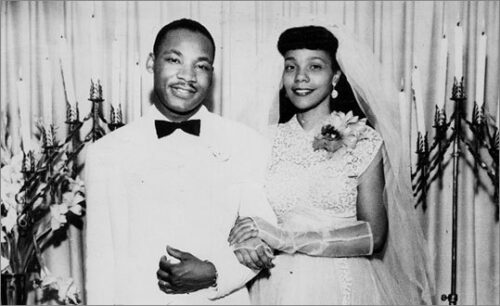
The newly-weds returned to Boston that fall to finish up their course work. Coretta would graduate in June of 1954 with a degree in Music Education, and ML finished up his doctorate dissertation later that fall.
A year later, in December 1955, the world was introduced to Martin Luther King Jr and Coretta Scott King as they led the Montgomery Bus Boycott.
Of Kings and Kennedys
During the time Martin Luther King Jr was living in Boston, two brothers, also with deep roots in Massachusetts, were on the verge of establishing a national platform that would lead their family to the White House.
John and Robert Fitzgerald Kennedy’s names will forever be remembered alongside King’s in one of the most important eras in American history.
Although King and the Kennedys didn’t always see eye to eye -and MLK was certainly frustrated from time to time with the brothers- he knew deep down, he had two allies that believed in him and he knew if not standing beside him, would stand behind him in the Civil Rights movement.
In October 1960, just weeks before JFK’s historic presidential election win over Richard Nixon, he called Coretta to express sympathy over King being imprisoned on an unjust hard labor sentence, following a protest that had gone awry. He ensured her he would work to have her husband released. RFK then used his political prowess to call Atlanta presiding judge J. Oscar Mitchell resulting in MLK being freed on a $2000 bond.
Daddy King, who earlier had been critical of the Kennedys devotion to the Catholic church, exclaimed: “I guess we’re all Catholic today,” following his son’s release. He then proceeded to have pamphlets distributed throughout many predominantly black congregations in the South campaigning for JFK, ultimately helping to secure the narrow victory over Nixon.
A couple years later, while King was visiting the White House, JFK took MLK out to the Rose Garden, eluding potential wire taps, to tip him off on allies of King’s the FBI had suspicions of. Already leery of his own government, Kennedy secretly warned King: “Be careful, they will come for you, and they will come for me.”
In August, 1963 just a few months before “they” did indeed come for Kennedy, MLK led the March for Freedom in Washington DC. As JFK smiled and watched his friend, King, like the great jazz musicians he saw many times back in the South End of Boston, masterfully adapted and audibled his iconic “I Have a Dream” speech to react to the 200,000 plus peaceful demonstrators.
JFK, a master orator himself, recognized what King was doing and moments later when MLK joined him in the White House Kennedy greeted his friend with a smile and burst out, “I HAVE A DREAM!”
That speech, that moment led to JFK initiating a strong federal civil rights bill in congress.
And it was in fact, mostly these same themes from the “I Have a Dream” speech that King delivered upon his most famous return to Boston in 1965.
Addressing a joint session of the Massachusetts Legislature, MLK highlighted the scourge of segregated schools and high levels of unemployment in both the city and country. Knowing the foundation Boston has to offer, he encouraged city officials to be a model of remediation to these ills in America.
He later led a march from the very Carter Playground in Roxbury where he used to play basketball to Boston Common, the site of The Embrace Memorial coming January 13, 2023.
For all King was beginning to accomplish with JFK at the time of President Kennedy’s assassination in November, 1963; it was with his brother Bobby that he truly got aligned with as the decade and Civil Rights movement progressed.
Originally the more skeptical of the two brothers, Bobby would eventually advance his thinking from being sympathetic to MLK’s causes to making massive efforts in understanding where he could offer full support and alignment.
As King expanded his platform from equality to the war on poverty, and then to speaking on ending the war in Vietnam, RFK echoed his thoughts and messages with his own platform.
When Kennedy announced his candidacy for Presidency in 1968, MLK was believed to be on a very short list of VP candidates being considered on the ticket with him.
All of that ended on April 4th, 1968 when an assassin’s bullet cut short the beautiful life of Martin Luther King Jr in Memphis, Tennessee.
Grieving back in the very hotel King was assassinated mere hours later, Ralph Abernathy, Andrew Young, and King’s other disciples reconvened grappling with the catastrophe that had just befallen.
What would now happen to the Civil Rights movement? Who could take King’s place? How could they help stop the rioting that had broken out in urban America — the violent antithesis of everything for which King had stood?
“We’d wanted to get on television and tell people not to fight, not to burn down the cities,” Young recalled. “We were trying to get the message out to people, ‘This is not what Dr. King would have you doing.’ But the press didn’t want to talk to us. Bobby Kennedy’s was the only voice we identified with that night. We were grateful he was out there.”
On April 4th, 1968 as RFK stood before a podium on 17th and Broadway in Indianapolis, Indiana -an inner-city area King himself had suggested his colleague campaign- Kennedy realized the thousands of gatherers in front of him had yet to hear of the passing of their civil rights leader.
Every single one of Kennedy’s advisors strongly urged -even begged- him to cancel his speech that evening. But Kennedy knew the civil rights movement needed him to speak. He knew America needed him to speak. He knew Martin Luther King Jr needed him to speak.
“What we need in the United States is not division; what we need in the United States is not hatred; what we need in the United States is not violence or lawlessness; but love and wisdom, and compassion toward one another, and a feeling of justice toward those who still suffer within our country, whether they be white or they be black.
So I shall ask you tonight to return home, to say a prayer for the family of Martin Luther King, that’s true, but more importantly to say a prayer for our own country, which all of us love–a prayer for understanding and that compassion of which he spoke.
We can do well in this country. We will have difficult times; we’ve had difficult times in the past; we will have difficult times in the future. It is not the end of violence; it is not the end of lawlessness; it is not the end of disorder.
But the vast majority of white people and the vast majority of black people in this country want to live together, want to improve the quality of our life, and want justice for all human beings who abide in our land.”
RFK’s words that evening were a first step in healing, in peacefully mourning the tragic loss of King. They were a reminder that the fight for equality and the civil rights movement would continue to live on.
Just two short months later, Bobby Kennedy too, was tragically assassinated.
1965 Freedom Plaza
“I don’t believe in cancel culture, and neither would have Dr. King,” KING Boston Executive Director Jeffries says. “The only way to truly fulfill Dr. and Mrs. King’s vision and to keep their dream alive is to peacefully educate individuals and groups that don’t share the same vision of equality and humanity.”
Part of keeping that dream alive will be the dedication of the 1965 Freedom Plaza alongside The Embrace Memorial next January.
Honoring 65 of Boston’s own civil rights leaders, the 1965 Freedom Plaza and The Embrace will serve as “spatial symbols on the Boston Common.”
They will provide a living space, Jeffries explains, for conversation and reflection while honoring the legacies that helped shape a more just and equitable Boston.
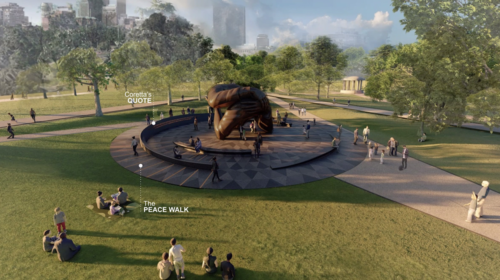
A Modern Day Patriot
In 2022, it has unfortunately become common dialect in more circles to denounce “Patriotism” and what the American flag and its values are supposed to stand for. Mandates, ostracism of individuals and groups, and hateful messaging remain a challenge now for our country, as it did during Dr. King’s time.
These circles are among the ones that need to be reminded of and educated on the peaceful teachings and life of Dr. Martin Luther King Jr and Coretta Scott King.
Dr. King loved America. He loved and believed in the Constitution and the power and the potential it has to lead a great and equal nation. He loved and believed in God and the power of faith. He believed in Patriotism.
His love and belief in humanity, and his fighting for America to reach her fullest and most beautiful potential through peaceful demonstrations is a model we should all live for.
Dr. Martin Luther King Jr was a modern day Patriot. It is up to us to keep his dream alive.
